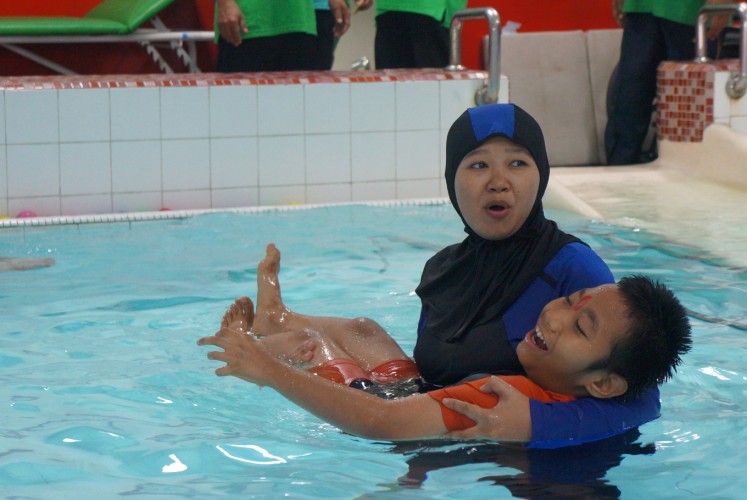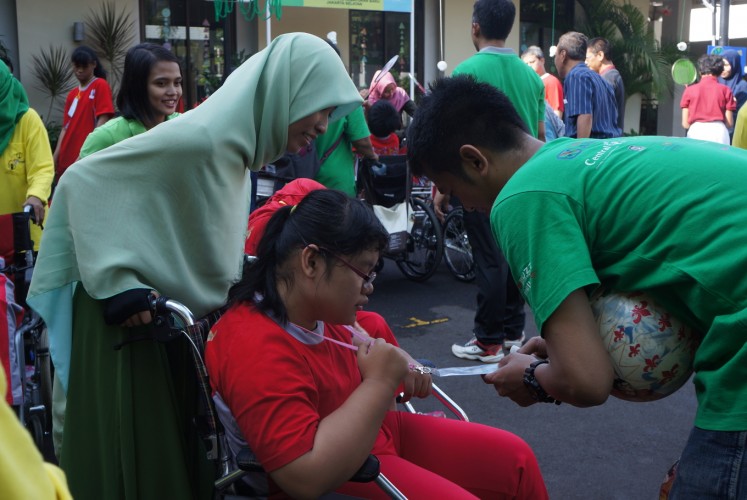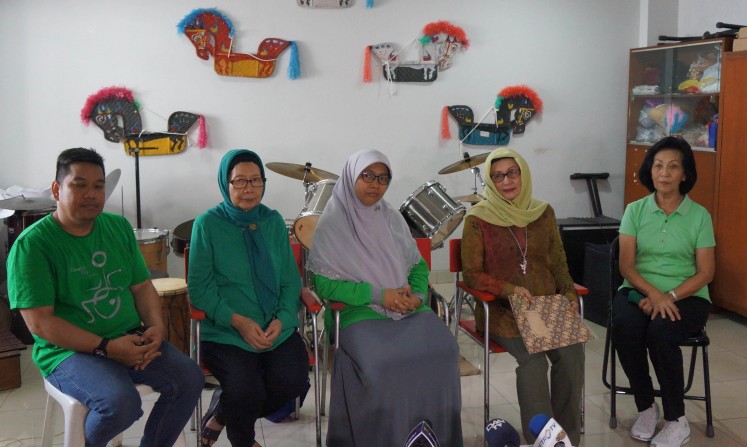Popular Reads
Top Results
Can't find what you're looking for?
View all search resultsPopular Reads
Top Results
Can't find what you're looking for?
View all search resultsMotor activities help foster independence in children with cerebral palsy
Cerebral palsy is a disorder that affects muscle tone, movement and motor skills.
Change text size
Gift Premium Articles
to Anyone
M
eylisa, a housewife from Rawamangun in East Jakarta, looked on with excitement as her daughter Afifah Salamah, who was diagnosed with cerebral palsy, finished her swimming lesson.
The 11-year-old had been wanting to learn how to swim for so long, she said.
Cerebral palsy is a disorder that affects muscle tone, movement and motor skills.
Afifah was one of the participants of the Motor Activity Training Program (MATP), a part of an event organized by the Foundation for the Rehabilitation of Disabled Children (YPAC) Jakarta.
Held on Friday at the YPAC Jakarta building in Kebayoran Baru, South Jakarta, the first instalment of the event was held to commemorate World Cerebral Palsy Day, which falls on Oct. 6, and World Occupational Therapy Day, which is celebrated every Oct. 27.
The program featured two activities: wellness using MATP as its concept and a Parent Support Group. In the former, participants joined activities held at five different locations. One of the activities, named Striking and Dexterity, invited them to smash shuttlecocks using a badminton racket. Meanwhile, those joining the Aquatic activity went swimming accompanied by event committees.
After finishing each game, participants received signatures from committee members that could be exchanged with prizes.
Read also: High-tech help for autistic kids: Robots
After finishing each activity, participants received signatures from committee members that could be exchanged with prizes. (JP/Ni Nyoman Wira)“Hopefully MATP can help stimulate the children to move,” said Jeri N. Sumual, therapy service manager at YPAC Jakarta, adding that the event was attended by 120 participants.
He said the event aimed to increase awareness about cerebral palsy and promote activities for people who have the disorder.
“Also, for parents, these children should be brought into focus because they also have a lot of potential. We saw earlier that many of them were able to learn by watching and doing,” Jeri said. “It’s important [for them to] be able to do these activities together.”
Jeri N. Sumual, therapy service manager of YPAC Jakarta (left); Yanti Sampoerno, YPAC Jakarta medical field manager (second left); Robiatul Adawiyah, YPAC Jakarta occupational therapist (center); Purnamawati M. Reksoprodjo, chairman of YPAC Jakarta (second right); and Riantini S. Wanandi, vice chairman of YPAC Jakarta. (JP /Ni Nyoman Wira)Parents also gathered for a Parent Support Group discussion, which encouraged them to actively participate in fostering their children’s independence.
“Children’s ability to participate depends on how their environment accepts them, because they will be affected by cerebral palsy for life,” said Robiatul Adawiyah, the foundation's occupational therapist. “We also want to introduce occupational therapy as one of the supporters of children’s independence as it focuses on analysing their daily activities, so they will be able to do them by themselves later.”
Although the foundation has existed for 60 years, both Purnamawati M. Reksoprodjo and Riantini S. Wanandi, who serve as chairman and vice chairman of YPAC Jakarta, respectively, conceded that cerebral palsy still lacked attention from the government.
In addition to staging more celebratory events in the near future, Purnamawati and Riantini also hoped for YPAC Jakarta and its missions to be better known among the public. (kes)














